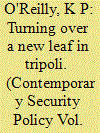| Srl | Item |
| 1 |
ID:
119673


|
|
|
|
|
| Publication |
2013.
|
| Summary/Abstract |
To further explore the impact of strategic culture on foreign policy, this article examines the development of the "Rogue Doctrine" within US strategic culture following the Cold War. Critics allege that this doctrine constrains strategic choice resulting in aggressive policies toward alleged rogue states. To assess the impact of this security narrative, the operational codes of two US presidents, William J. Clinton and George W. Bush, are examined. Analysis reveals distinct differences between their perceived interactions with rogue and nonrogue states. The resulting interactions manifest the unique nature of US-rogue state interactions as these US leaders possess starkly different images of both rogue others as well as self. In the context of dealing with rogue states, these leaders' perceptions of self undergo major transformations indicating tendencies toward more aggressive tactics and the use of force.
|
|
|
|
|
|
|
|
|
|
|
|
|
|
|
|
| 2 |
ID:
098390


|
|
|
|
|
| Publication |
2010.
|
| Summary/Abstract |
Over the past decade, Libya's international reputation has undergone a remarkable transformation. Previously a rogue state, Libya has been welcomed back into the international community after renouncing international terrorism and its weapons of mass destruction programs. Was this the result of a straightforward calculation of self-interests given the realities of the international system or some shift in Libyan leader Mu'ammar Qaddafi's world view? To assess this transformation, operational code analysis is utilized to systematically identify Qaddafi's world view and determine whether he underwent experiential learning, attributable to fundamental transformation of his world view, or a simple adaptation to the surrounding international environment. The findings indicate that while experiencing a modest degree of learning over time, Qaddafi did not undergo a significant transformation, but rather adapted to the international system around him. The analysis here supports viewing Libya's transformation cautiously, as perhaps a limited, temporary, and pragmatic move. For foreign actors trying to deal with seemingly other unpredictable leaders, the Libyan experience suggests that decision-making should be based on greater knowledge about the motives of individual leaders and their responsiveness to specific initiatives.
|
|
|
|
|
|
|
|
|
|
|
|
|
|
|
|